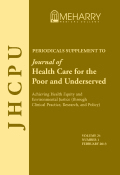
JOURNAL OF HEALTH CARE FOR THE POOR AND UNDERSERVED
Scope & Guideline
Bridging gaps in healthcare access and outcomes.
Introduction
Aims and Scopes
- Health Disparities and Equity:
The journal investigates the social determinants of health and how they affect health outcomes across different demographics, particularly among marginalized communities. - Access to Care:
Research often focuses on barriers to healthcare access for underserved populations, including those facing socioeconomic challenges, racial and ethnic minorities, and individuals with limited English proficiency. - Innovative Care Models:
The journal highlights innovative healthcare delivery models, including telehealth, community health workers, and integrated care approaches that aim to improve health outcomes in underserved populations. - Policy Analysis:
There is a strong emphasis on analyzing health policies and their impacts on vulnerable populations, including Medicaid expansion, health insurance disparities, and the effects of legal barriers on healthcare access. - Community Engagement and Participatory Research:
The journal promotes research that involves community participation, aiming to empower local populations and incorporate their voices into health solutions.
Trending and Emerging
- Impact of COVID-19:
Research addressing the effects of the COVID-19 pandemic on health access and outcomes for underserved populations has surged, exploring issues such as vaccine access, telehealth adaptations, and the pandemic's exacerbation of existing health disparities. - Mental Health and Substance Use:
There is an increasing focus on the intersection of mental health and substance use disorders, particularly in marginalized communities, highlighting the need for integrated care approaches that address these complex issues. - Technology and Health Equity:
Emerging themes around the use of technology, including telehealth and mobile health applications, aim to improve access to care and health literacy among underserved populations, reflecting a shift towards digital health solutions. - Legal and Social Determinants of Health:
Research is increasingly examining the legal aspects affecting health outcomes, particularly how legal barriers intersect with social determinants to impact health for vulnerable groups. - Culturally Competent Care:
There is a growing emphasis on culturally competent care practices tailored to the needs of diverse populations, including training for healthcare providers to better address the specific needs of underserved communities.
Declining or Waning
- Traditional Healthcare Models:
There appears to be a waning focus on conventional healthcare delivery systems without integration of community-based approaches, as newer models that emphasize collaboration and innovation gain traction. - Generalized Public Health Topics:
Research on broad public health issues, such as general disease prevention strategies, may be declining as the journal shifts towards more specialized studies that address specific populations and their unique health challenges. - Non-Policy Related Research:
There is less emphasis on purely academic studies that do not address policy implications or practical applications, as the journal increasingly values research that can inform and influence health policy.
Similar Journals

JOURNAL OF PUBLIC HEALTH DENTISTRY
Pioneering Research for a Brighter Oral Health FutureJOURNAL OF PUBLIC HEALTH DENTISTRY, published by WILEY, serves as a premier platform for disseminating research and insights critical to the field of public health dentistry. Established in 1941, the journal has adapted to contemporary developments, featuring a convergence of scholarly work that spans from 1941 to 2024. With an ISSN of 0022-4006 and an E-ISSN of 1752-7325, it has garnered recognition within the dental community, holding a Q2 ranking in Dentistry (miscellaneous) and Q3 in Public Health, Environmental, and Occupational Health as of 2023. Researchers and professionals alike can benefit from the journal's commitment to exploring the intricate connections between oral health and public welfare, making it an essential read for those striving to advance knowledge and practice in these interconnected domains. Although it does not offer Open Access, the journal remains highly valuable for those seeking to stay at the forefront of dental public health research, as evidenced by its solid Scopus rankings—positioned at 45/132 in General Dentistry and 264/665 in Public Health. This journal is not just a repository of articles; it is a vital resource for practitioners and academics dedicated to improving oral health outcomes and understanding their broader societal implications.
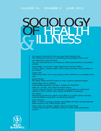
SOCIOLOGY OF HEALTH & ILLNESS
Pioneering Studies in Health Sociology Since 1979Sociology of Health & Illness is a leading academic journal published by Wiley, dedicated to exploring the intricate relationships between health, illness, and society. With an ISSN of 0141-9889 and an e-ISSN of 1467-9566, this journal has established a significant presence since its inception in 1979, continuing to provide valuable insights through to 2024. Recognized in the Q1 quartile across multiple categories, including Health Policy, Health (Social Science), and Public Health, Environmental and Occupational Health, it ranks impressively at 52nd in Social Sciences and holds a robust reputation with a Scopus classification that places it within the top percentiles of its field. The journal’s objectives focus on publishing high-quality research that advances understanding of the social determinants of health and their implications, making it indispensable for scholars, professionals, and students committed to health-related research. Operating from its headquarters in the United Kingdom, **Sociology of Health & Illness** contributes significantly to the global discourse on health and social welfare, reinforcing its vital role in shaping knowledge and policy in health and social sciences.

JOURNAL OF BEHAVIORAL HEALTH SERVICES & RESEARCH
Advancing knowledge in behavioral health services.JOURNAL OF BEHAVIORAL HEALTH SERVICES & RESEARCH, published by Springer, is a premier peer-reviewed journal dedicated to advancing the scientific understanding of behavioral health services and their impact on individuals and communities. With its esteemed standing in the academic realm, as demonstrated by its Q1 ranking across multiple categories including Health Policy and Public Health in 2023, this journal offers vital insights into the intricacies of health service delivery, policy innovation, and the social determinants of health.
Since its inception in 1996, the journal has played a crucial role in disseminating high-quality research that addresses the evolving challenges in health services, and is uniquely positioned to contribute to the evidence-based advancements in this field through its valuable contributions and a growing repository of knowledge. Researchers, professionals, and students can benefit from both open access options and a subscription model to stay abreast of transformative trends and empirical evidence shaping behavioral health services.
As it continues to converge into the future, this journal remains a vital platform for those committed to enhancing the effectiveness of health services and promoting significant improvements in health outcomes across diverse populations.
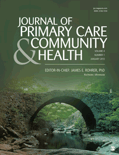
Journal of Primary Care and Community Health
Championing primary care excellence for global health.Journal of Primary Care and Community Health, published by SAGE Publications Inc, is a leading open-access journal dedicated to advancing the understanding and practice of primary care and community health. With an ISSN of 2150-1319 and E-ISSN 2150-1327, it has positioned itself as a vital resource since its inception in 2010, providing a platform for rigorous research that impacts public health and community welfare. Recognized with a prestigious Q1 ranking in both Community and Home Care and Public Health, Environmental and Occupational Health as of 2023, the journal boasts an impressive Scopus rank of #4 among 40 journals in its category, marking it as a top-tier publication in the nursing field. This journal emphasizes the significance of integrating research and practice, fostering a collaborative approach among researchers, healthcare professionals, and students. With open access availability since 2017, the journal ensures that vital findings and innovative practices remain accessible to a global audience, furthering the collective mission of improving health outcomes in communities around the world.

COMMUNITY MENTAL HEALTH JOURNAL
Empowering communities with groundbreaking insights in mental health.Community Mental Health Journal is a leading publication in the field of mental health, managed by Springer and based in the United States. Since its inception in 1965, this journal has provided a critical platform for advancements in mental health research and community practices, with a convergence set to continue until 2024. It boasts an impressive impact factor and ranks in the first quartile (Q1) for Health (Social Science) as well as Public Health, Environmental and Occupational Health, underscoring its significance in interdisciplinary scholarship. The journal caters to a diverse audience, including researchers, practitioners, and students, fostering a deeper understanding of community mental health issues. With a commitment to highlighting innovative research and practical applications, the Community Mental Health Journal serves as an invaluable resource for those dedicated to improving mental health outcomes in communities globally.

JNCI Cancer Spectrum
Empowering researchers with cutting-edge findings.JNCI Cancer Spectrum, published by Oxford University Press, is a leading open-access journal dedicated to advancing the field of cancer research and oncology. With an impressive impact demonstrated through its Q1 ranking in both Cancer Research and Oncology categories for 2023, this journal provides a vital platform for disseminating high-quality research and innovative findings in a rapidly evolving landscape. Since its inception in 2017, JNCI Cancer Spectrum has embraced open access, enhancing the accessibility of evidence-based knowledge to researchers, professionals, and students across the globe. Additionally, it boasts notable positions in Scopus rankings, with a strong performance in both the Medicine and Biochemistry, Genetics and Molecular Biology categories. The journal is committed to its objectives of fostering collaborative efforts and encouraging dialogue among experts, making it an essential resource for anyone involved in cancer research.
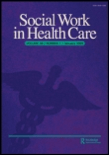
SOCIAL WORK IN HEALTH CARE
Empowering Professionals at the Intersection of Social Work and HealthSOCIAL WORK IN HEALTH CARE is a premier peer-reviewed journal published by Routledge Journals, Taylor & Francis Ltd, focusing on the dynamic intersection of social work practices and health care systems. With an impressive track record spanning from 1975 to 2024, this journal plays a pivotal role in advancing the scholarship and practice of social work within medical settings. It is recognized for its strong impact in the field, reflected in its commendable positioning in multiple categories, achieving Q1 status in Community and Home Care and Q2 rankings in both Psychiatry and Mental Health and Social Work. Researchers and professionals will find valuable insights and current trends that address crucial issues such as mental health support, community care strategies, and health policy implications, thereby enhancing their understanding and effectiveness in the field. While currently not offering open access options, the rigorous standards of this publication ensure that each contribution is a reliable resource for advancing knowledge and practice. Join a global community of scholars dedicated to improving the integration of social work in health care settings, and contribute to this vital discourse.

Health Equity
Advancing equitable healthcare solutions for all.Health Equity is an esteemed open-access journal published by MARY ANN LIEBERT, INC, dedicated to advancing knowledge in the fields of health information management, health policy, and public health. With an E-ISSN of 2473-1242 and a commendable Q1 ranking in multiple categories for 2023, including Health Information Management and Health Policy, this journal stands at the forefront of addressing the complexities of health disparities and promoting equitable healthcare solutions. By providing a platform for original research, critical reviews, and innovative methodologies since its inception in 2017, Health Equity plays a crucial role in facilitating dialogue among scholars, practitioners, and policymakers. The journal's commitment to open access ensures that its valuable content is freely available, fostering collaboration and knowledge dissemination within the global health community. As it converges from 2017 to 2024, Health Equity continues to empower its readership to drive impactful changes in health systems and policies worldwide.

Comunidad y Salud
Bridging theory and practice in public health.Comunidad y Salud is a noteworthy academic journal published by the Universidad de Carabobo, dedicated to the field of public health and community well-being. With the ISSN 1690-3293, this journal serves as a crucial platform for disseminating research focused on health promotion, community engagement, and the socio-economic determinants of health within diverse populations. It aims to foster interdisciplinary dialogue and collaboration among professionals, researchers, and students interested in improving public health outcomes. Although it does not operate under an open access model, the journal's rigorous peer-review process ensures the publication of high-quality research that contributes significantly to the advancement of community health practices in Venezuela and beyond. By bridging theory and practice, Comunidad y Salud plays an essential role in shaping health policies and practices that impact local communities.
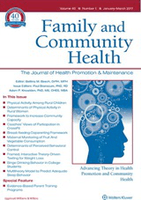
FAMILY & COMMUNITY HEALTH
Connecting Families and Communities Through Health InsightsFAMILY & COMMUNITY HEALTH, published by Lippincott Williams & Wilkins, is a prestigious journal that has been at the forefront of public health research since its inception in 1978. With its ISSN (0160-6379) and E-ISSN (1550-5057), the journal serves as a vital resource for professionals, researchers, and students dedicated to understanding the intricate dynamics between family and community health. Its significant impact is illustrated by its placement in the Q2 category within Public Health, Environmental and Occupational Health, highlighting its relevance and quality in a competitive field. The journal ranks #358 out of 665 in Scopus, further emphasizing its role in disseminating high-quality research. FAMILY & COMMUNITY HEALTH not only provides a platform for innovative research articles but also fosters collaboration among health professionals aiming to improve care delivery and promote community well-being. Researchers and practitioners alike will find invaluable insights and data within its pages, making it an essential addition to any academic collection.